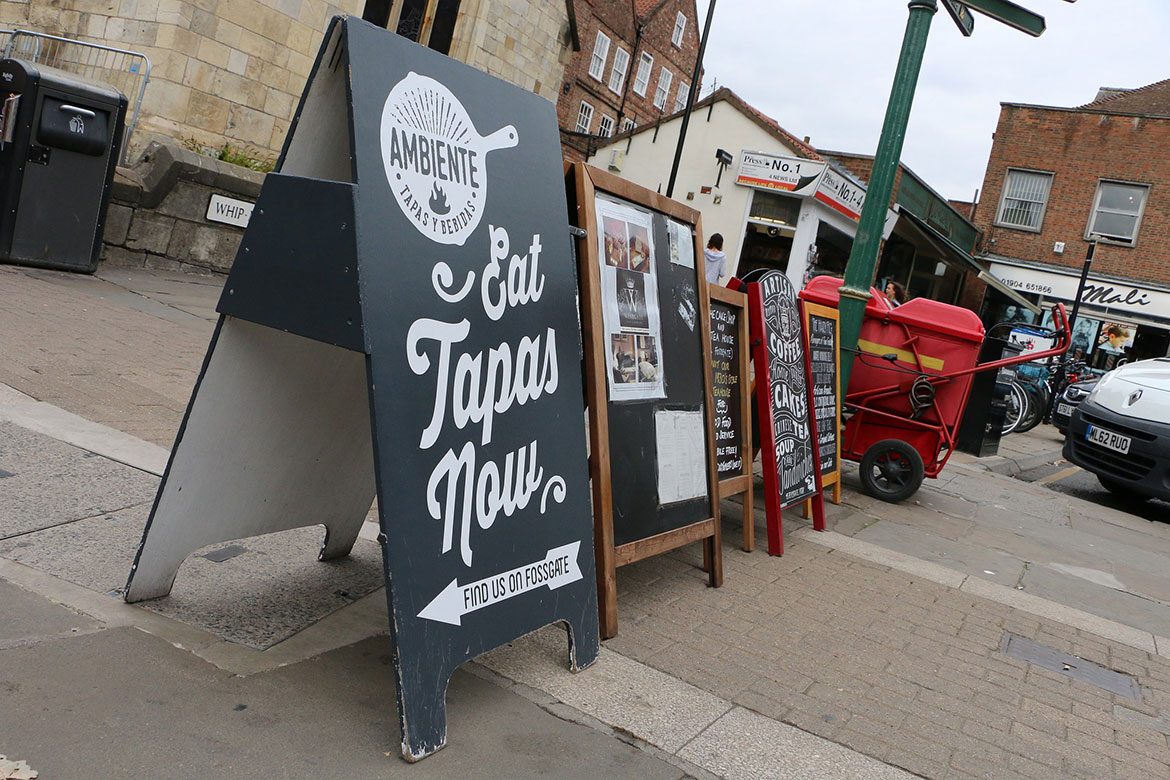Depending on who you talk to, they are either a crucial business tool or a danger to pedestrians.
After years of wrangling about the risks and merits of A-boards, City of York Council have finally come down on one side.
And they’re to be banned. Mostly.
Under a policy, to be trialled for a year, retailers and other businesses have four months’ grace before the A-board is outlawed within the inner ring-road from January 1, 2017.

And it’s not just A-boards. All other “comparable advertising materials/ features placed on the highway” will be banned.
The only exception is Micklegate, which is deemed to have wide enough pavements to allow A-boards. But businesses here will still need to apply for a licence to have one.
This plan needs to be approved by the executive meeting on Thursday, August 25. If it is, the council will carry out a full analysis of the year-long trial and produce a subsequent report in 2018.
Why are A-boards going?
A survey in late 2012 found there were around 150 A-boards placed in York city centre. In some cases up to eight were placed in a consecutive line, often on narrow footstreets.
By early 2013, the level of obstruction of the footway was a growing concern.
It was considered a very real problem for blind or partially sighted people, or anyone in a wheelchair.
Some were tied to trees and others were obstructing the footpaths leaving little safe space for pedestrians.
There is also a perception that the A-board look messy and detract from the beauty of the city.

What are the alternatives?
The council will be suggesting a number of alternatives to using regular A-boards to businesses and retailers located within the zone.
These include…
1. A city approved board (CAB)
This would be a wall- or building-mounted board approved by the council in partnership with the Business Improvement District (BID).
CABs would be an officially-sanctioned signpost or advert for a private businesses – with limited locations and strict criteria.
According to the draft A-board policy these are the criteria for a mounted CAB:
Where the sole/primary route/access to a business is via a narrow lane, passageway, snickleway or similar.
That is where it does not have an obvious frontage/shop window directly on a main pedestrian thoroughfare (or other means to ‘signpost’ its location).
 The Dubrovnik example
The Dubrovnik example
York’s new policy draws on the example of the historic walled city of Dubrovnik in Croatia.
This UNESCO World Heritage city uses a uniform banner which is wall-mounted at the entrance to the many narrow lanes, advertising the business, shops and restaurants.
2. The remote or shared A-board
This would be a private version of the CAB above, and only allowed under the same circumstances.
A business, or group of businesses, could propose a private board to be located on a building. This will often require a planning application, which will consider the implications.
Alternatively a proposal for a board to be placed on the pubic highway would require a license application…

3. Licensed A-boards
Businesses on Micklegate, and any business wanting remote or shared boards as above, would have to obtain a licence from the council.
To gain the licence, the businesses must meet a set of rules including:
- A-boards to be positioned only within the property frontage – adjoining/abutting
- A-boards to be free standing and immediately removable by hand
- A-board licensee must have public liability insurance to indemnify City of York Council against any claims.
What people say
 This has been a long standing issue here in York so I welcome this trial. We need to balance the impact of A-boards on the public with the livelihood of small businesses.
This has been a long standing issue here in York so I welcome this trial. We need to balance the impact of A-boards on the public with the livelihood of small businesses.
We also need to ensure support is provided to help find alternative methods of advertising and that all relevant bodies continue to be consulted throughout this trial.
– Cllr Ian Gillies, executive member for transport and planning
 Opinions are definitely split. There are some retailers who say A-boards are an absolute eyesore, they shouldn’t be allowed, they’re a mess and a trip hazard. Others say they’re an essential tool to their business. There are passions on both sides.
Opinions are definitely split. There are some retailers who say A-boards are an absolute eyesore, they shouldn’t be allowed, they’re a mess and a trip hazard. Others say they’re an essential tool to their business. There are passions on both sides.
– Frank Wood, York Retail Forum
 I’m equally passionate for both sides. Right above my shop there’s a beauty salon called Belleza, owned by Samantha Armitage. You wouldn’t know she is there if she didn’t use an A-board.
I’m equally passionate for both sides. Right above my shop there’s a beauty salon called Belleza, owned by Samantha Armitage. You wouldn’t know she is there if she didn’t use an A-board.
If the council bans A-boards there is no way passing traffic will know she is there. That goes the same for any small business tucked away in a little lane – like Little Stonegate or Back Swinegate.
On the other hand, if you look down Stonegate there is one A-board after another outside the big shops. There is no need for that. There is no need for A-boards outside a shop quite clearly visible from the main street.
I want York to look the best and to show its heritage. I don’t think A-boards, in the numbers that we have them, give the city the right image.
– Hanus Wolf, owner, Burgins Perfumery
